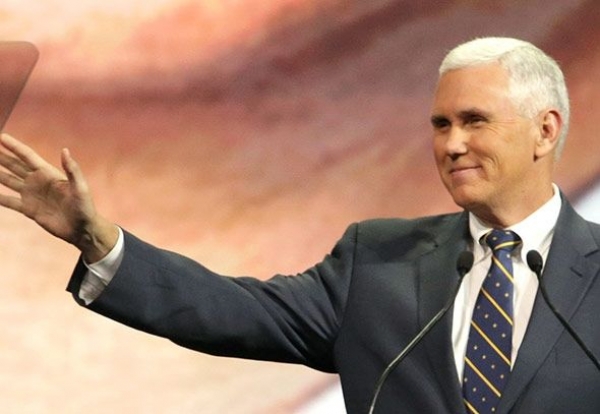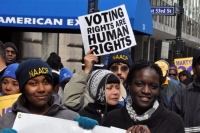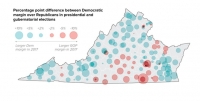For another thing, Pence’s launch of a new government-run news service, “Just IN,” ran into so much ridicule that it was shut down well before the first issue of the Pence Pravda could hit the newsstands.
But Pence can take solace in the fact that he has this week achieved something far more consequential than these fleeting tribulations. His agreement with the Obama administration to expand Medicaid in Indiana on the state’s own terms may very likely come to be seen as a major turning point in the central battle in the implementation of Obamacare. More than that, the staunchly conservative Pence may have taken a big step toward fundamentally reshaping one of the country’s biggest safety-net programs—so much so that many liberals who generally cheer any expansion of coverage are feeling deeply ambivalent about this development.
Their ambivalence is understandable. But in the context of the extraordinarily toxic political environment around Obamacare, the Indiana news should be viewed as a step forward.
Some background: Half of the expansion of health coverage under Obamacare was supposed to come through raising the eligibility threshold for Medicaid, which varied greatly from state to state, to a uniform level of 138 percent of the poverty level—about $32,000 for a family of four or $16,000 for a childless adult. But in its 2012 ruling upholding the Affordable Care Act as constitutional, the Supreme Court also declared the Medicaid expansion optional. And many states—including most of those with the highest levels of uninsured, such as Texas, Georgia, and Florida—have rejected the expansion, even though the federal government would cover virtually the entire cost. This means that millions of low-income people remain uninsured—even as middle-class people across the country qualify for federal subsidies to help them buy private coverage—thus greatly undermining the central purpose of the law.
The Obama administration has been so eager to close this coverage gap among the neediest Americans that it has cut deals with several states—notably Arkansas, Iowa, Michigan, and Pennsylvania—to allow them to expand Medicaid in ways that differ from the traditional program. But the concessions it made to Pence and Indiana go far beyond what it has agreed to previously. The expansion will cover 350,000 people in Indiana, which previously had very stringent eligibility levels—adults qualified only if they had young children and were virtually indigent, making less than a quarter of the poverty level. But under the plan, Hoosiers above the poverty level will have to pay a monthly premium of 2 percent of their income—as much as $25 a month for a single childless adult—for coverage. Those under the poverty level won’t have to pay the premium to get basic coverage, but they won’t qualify for dental and vision benefits unless they do pay the premium. The rule will effectively create a waiting period before people get coverage, as the state determines whether they’re paying their premiums and what level of coverage they qualify for. And, in a first for Medicaid, Indiana will lock out people earning above the poverty level from their coverage for six months if they fail to pay their monthly premiums.
Hoosiers on Medicaid will also need to make copayments—including, in an another first for Medicaid, paying $25 for an emergency room visit if they’ve previously made what are deemed to be needless visits to the emergency room.
The Obama administration has been left looking for ways to reckon with the GOP’s anti-welfare mindset.
These may not sound like big sums or onerous requirements. But advocates for universal health coverage are worried that they’ll deter Hoosiers from actually seeking coverage and care, because studies have found premiums and copays, even small ones, have a highly deterrent effect on the poor, which is why Medicaid has generally steered clear of requiring them. “Medicaid was designed to make this coverage work for low-income people,” says Leonardo Cuello, director of health reform for the National Health Law Program. Judy Solomon, of the Center on Budget and Policy Priorities, worries that the sheer complexity of the plan—which also includes a health savings account where people are supposed to save for health costs—will keep many Hoosiers away. It’s ironic that in making Medicaid more conservative, Pence has made it much more complicated and bureaucratic: “They’re going to have thousands making these tiny contributions, and then [the state] makes tiny payments to lots of providers. The transaction costs have got to be enormous,” says John Holahan of the Urban Institute.
Most of all, some advocates worry that the Indiana model will become the model for the other 20-odd states that have yet to expand Medicaid—or worse, the starting point, as even deeper red states seek bigger concessions for themselves, perhaps by insisting on bigger premiums and copays for people further down the income ladder. Sara Rosenbaum, of Georgetown Law School, worries that the Indiana plan could even become the model for congressional Republicans if they seek a major nationwide overhaul of Medicaid—which now insures 68 million Americans—as part of some future post-Obamacare realignment of health care.
Link to original article from Slate


 Imagine going to the polls on Election Day and discovering that your ballot could be collected and reviewed by the
Imagine going to the polls on Election Day and discovering that your ballot could be collected and reviewed by the ACLU Blueprints Offer Vision to Cut US Incarceration Rate in Half by Prioritizing 'People Over Prisons'
ACLU Blueprints Offer Vision to Cut US Incarceration Rate in Half by Prioritizing 'People Over Prisons'  "These disasters drag into the light exactly who is already being thrown away," notes Naomi Klein
"These disasters drag into the light exactly who is already being thrown away," notes Naomi Klein  How about some good news? Kansas Democratic Representative advances bill for Native Peoples.
How about some good news? Kansas Democratic Representative advances bill for Native Peoples.  What mattered was that he showed up — that he put himself in front of the people whose opinions on
What mattered was that he showed up — that he put himself in front of the people whose opinions on On a night of Democratic victories, one of the most significant wins came in Virginia, where the party held onto
On a night of Democratic victories, one of the most significant wins came in Virginia, where the party held onto A seismic political battle that could send shockwaves all the way to the White House was launched last week in
A seismic political battle that could send shockwaves all the way to the White House was launched last week in In an interview with Reuters conducted a month after he took office, Donald Trump asserted that the U.S. had “fallen
In an interview with Reuters conducted a month after he took office, Donald Trump asserted that the U.S. had “fallen Attorney General Jeff Sessions overturned the sweeping criminal charging policy of former attorney general Eric H. Holder Jr. and directed
Attorney General Jeff Sessions overturned the sweeping criminal charging policy of former attorney general Eric H. Holder Jr. and directed